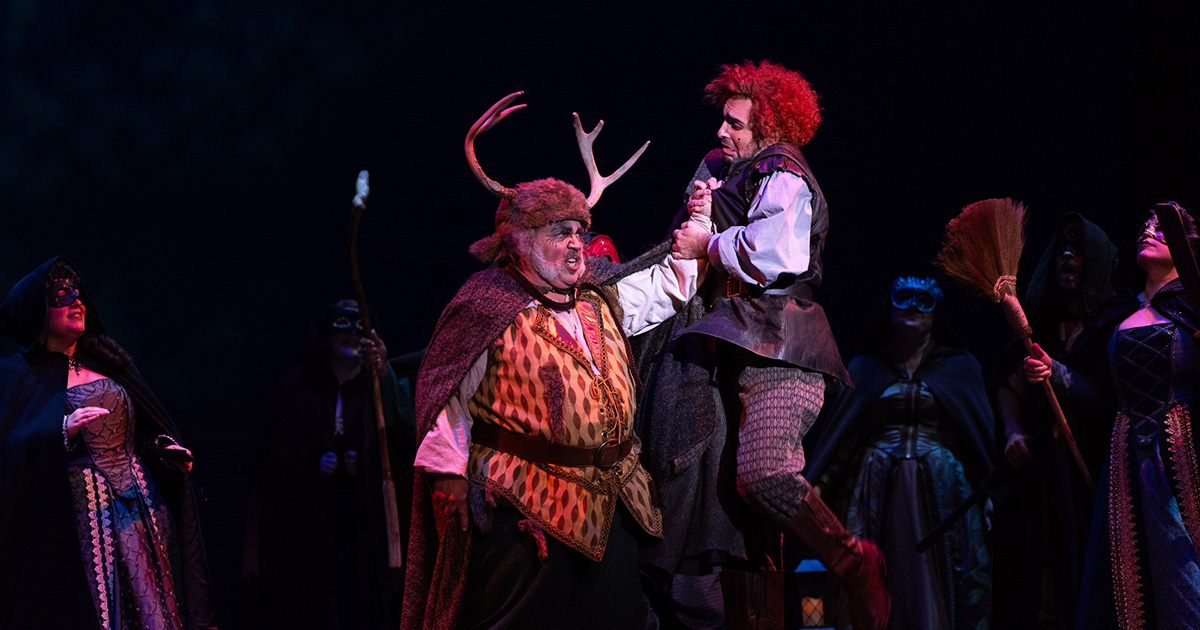In his Friday evening pre-curtain remarks to the audience for Verdi’s Falstaff, Knoxville Opera General Director Jason Hardy asked for a show of hands of those seeing a KO production for the first time. Surprisingly, what looked like a majority of those in the Tennessee Theatre audience raised their hands. Clearly, there was a message in that response, but what was that message? While attracting new opera-goers is obviously an important, if not essential goal of opera companies, one expects the existing core of opera devotees and the classical music public—whether traditionalists or those that love an operatic challenge—to continue to present themselves in substantial numbers.
As it turned out, this production of Falstaff by Knoxville Opera was a hands-down, exhilarating winner for everyone in attendance, new or otherwise. Directed by KO’s Dean Anthony with cleverness and crisp pacing, the work came to life, not only as a marvelously physical ensemble piece for the ten main characters, but also as a showcase for individual roles that received top-notch, often stunning, performances.
Conductor Jorge Parodi with the Knoxville Symphony Orchestra in the pit managed Verdi’s move into more adventurous and complex orchestrations with the expected skill. The use of individual instruments (for example, guitar and English horn) as character reflections were certainly part of the journey.

Of course, the opera, based on Shakespeare’s The Merry Wives of Windsor, revolves around the dissolute ways of the deliciously flawed knight, Sir John Falstaff (Steven Condy). Attired in a fat suit and a wig of wild tufts, Condy staggers about making clear he has lost the battle with gluttony, failing to rein in girth among other things—and proud of it. Should anyone fail to see the error of his lifestyle, his lackeys, Bardolfo (Gregory Sliskovich) and Pistola (James Robinson) were there to argue and take advantage of a situation.
One would have been satisfied with a raspy, ill-voiced Falstaff, but Condy gave much more, treading a brilliantly fine line of vocal clarity that took his eminently impressive baritone voice to the edge of both comedy and operatic sadness and melancholia. Condy’s dramatic performance was simply everything one could want in a Falstaff.
For the most part, Falstaff’s opponents are the opera’s trio of female characters who plan a trick on, uh, comeuppance, on the knight for his bad behavior and blatant attempts at securing their fortunes. Tori Patricia Franklin, a UT Opera Theatre Alumna, sang a beautifully powerful yet lyrical Alice Ford, the leader of the plot to humiliate and punish Falstaff. Franklin was solid in Anthony’s physical comedy in the role as was the focused and charming Eliza Bonet as Meg Page. Renee Tatum, a recent addition to the UT College of Music voice faculty, offered a rich, lucious voice and a seductive presence for the role of Dame Quickly. Tatum’s scene with Falstaff was a comic highlight.
The roles of the young lovers, Nannetta and Fenton, were given substance and an energetic prominence by soprano Rebekah Howell and tenor Derrek Stark, respectively. The couple, wishing to marry but thwarted by her father, Ford (Kevin Godinez), really is the quintessence of operatic cuteness. Filling out the cast was the solid John Overholt as the assuming and unpleasant Dr. Caius, Isla Burdette as the Page, and KO’s Don Townsend as the Innkeeper at the Garter Inn.
As Verdi’s final opera coming some six years after the previous Otello, Falstaff shows the composer’s begrudging acceptance of the musical influences bombarding him from the Wagnerian world. As a result, the orchestrations in Falstaff are more complex despite his railing against “symphonic” scores and the suggestions of motif. One couldn’t help wondering how the amazing final fugue in Act III that ends the opera (“Tutto nel mondo è burla”) was Verdi’s comment on that complexity. “Everything in the world is a jest … but he laughs well who laughs the last laugh.”








